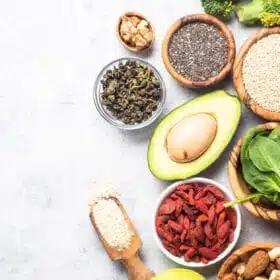You eat healthy and train diligently, and yet the display of your scale climbs up bit by bit. But what could be the reason for this? In most cases we can clearly determine why we are gaining weight. Either it is due to too little training or excessive eating.
So we know what the root of all evil is, even if we hate to admit it. However, there are also a few admittedly mean causes that lead to weight gain and are not so easy to discover. So that you don't lose your motivation, in the following article we would like to introduce you to five typical reasons so that you can avoid them right from the start.
Reason 1 - You sleep too little
There are a number of good reasons for getting plenty of sleep. And by no means is it just a matter of waking up well-rested in the morning, but also of avoiding unnecessary weight gain. But where is the connection? Quite simply, when we sleep, our body has the opportunity to heal itself, regulate hormone levels and process the stress of the day. So when we suffer from lack of sleep, not only our mood suffers, but also our health.
Lack of sleep also makes us more inclined to uncontrollably reach for foods that provide us with quick energy. Foods with a high carbohydrate content are particularly predestined here, as we need a quick energy boost after waking up. Lack of sleep, by the way, is also the reason for extensive nighttime snacks and the tendency to skip workouts once too often. Ok, but let's say you are mentally strong enough to resist all these temptations, but still gain weight.
There is also an explanation for this, because the lack of sleep also completely upsets your hormone levels. In detail, it is mainly about the high concentration of the stress hormone cortisol. This hormone, in too high concentrations, stupidly causes you to have more appetite than usual and promotes fat storage. What is the solution to the problem?
The solution is as simple as it is obvious: you need to allow yourself more sleep. Seven to nine hours a night is optimal, and you should get into the habit of going to bed earlier and getting up early accordingly. In addition, power naps at noon or in the afternoon have proven to be a very effective solution. Snoozing on your desk chair for 20-30 minutes is already enough to significantly reduce fatigue.
TIME TO SLEEP
is a drink powder that can be taken before going to bed or during stress. Due to its high-quality and proven ingredients such as GABA, L-glutamine, melatonin, magnesium, inositol and L-theanine, it helps your body to relax, shut down and better fall asleep and sleep through.
TIME TO SLEEPReason 2 - You fall into the sweetener trap
Today, high sugar consumption is one of the biggest fines to our health. It's no wonder that countless products labeled "sugar-free" or "light" are piled up on the shelves of most supermarkets. But sugar-free doesn't necessarily mean healthy. In fact, sugar-free foods can have a much greater impact on your health and fitness than you might think. Recent studies have shown that sugar substitutes such as aspartame can stimulate the appetite.
Artificial sweeteners can be up to 200 times sweeter than regular table sugar. This causes your taste buds to become accustomed to the extreme sweetness, so your taste preferences change as well. This, in turn, subconsciously causes you to use real sugar in excess as well. This, of course, makes losing weight a challenge. Another danger is the so-called "diet-drink" phenomenon. Here, your metabolism reacts to the stimulus of sweetness just as if you had consumed real sugar. This in turn leads to your body also releasing larger amounts of insulin to process this "seemingly" present sugar.
Well, and since there is no sugar, you automatically reach for real sugar so that the insulin also has something to do. The result is a vicious circle that leads to reduced insulin sensitivity, weight gain and type II diabetes. So the solution is: less is more. So avoid artificial sweeteners as much as possible and instead go for the original product in moderation, for example when you feel like a cola. Otherwise, you should avoid both granulated sugar and sweeteners. Alternatively, fruit juices, fruits and honey can be used for sweetening.
Reason 3 - You have too much stress
Stress is not a good condition because, as mentioned at the beginning, it also results in the release of large amounts of stress hormones such as cortisol. When stress levels are persistently too high, it doesn't take long before we try to compensate for this condition with poor eating habits as a kind of reward for coping with stress. As Harvard University assistant professor Jason Perry Block reports, food consumption is actually directly related to relaxation and stress level reduction. The cause is the release of stress-reducing neurotransmitters in response to food intake.
So when you are highly stressed, you don't even necessarily notice when you eat too much. So the solution is clear: stress reduction. Since we can't always reduce our work or study load massively, relaxing activities are a good option to give your mind a bit of a break. For example, try a walk in the woods, a yoga class, some meditation, or a round of cardio. Just consciously take time on a regular basis to do an activity you really love, and you'll see how quickly your stress vanishes into thin air.
Boosts your metabolism:
Reason 4 - You suffer from food sensitivities
The topic of food allergy and food intolerance has become an increasingly big issue in recent years. Although in many cases this is due less to substantial facts and more to hypersensitive perception, undetected food intolerances are actually a real reason for unwanted weight gain. While a true food allergy is often easy to recognize and can even have life-threatening consequences, simple intolerances often remain undetected for a long time.
This is also due to the rather non-specific symptoms such as flatulence, a bloated feeling, fatigue and weight gain. These, in turn, are the body's reactions to defending itself against the allergens in the food. As New York Times bestselling author Mark Hyman explains, these inflammatory reactions are a key risk factor for weight gain because the body can no longer function efficiently due to the "danger defense." But there is good news, because food intolerances are often easy to diagnose.
At the next opportunity, simply talk to your family doctor about your suspicions. Blood tests and allergy tests are usually enough to find the culprit. But you can also do something yourself by temporarily eliminating the most problematic foods from your diet for testing purposes. Foods containing lactose and gluten are often the first suspects. If your well-being improves significantly within six weeks, you have found the cause of your unwanted weight gain.
Reason 5 - You've lost track of your portion size
Your daily diet may consist entirely of healthy things. But calories remain calories, regardless of their form of presentation. And if you overdo it - even with healthy foods - weight gain is the inevitable result. Let's take a serving of nuts as an example: A handful of nuts is very healthy, but it also has around 200 calories. Add a second handful of this actually healthy food on a stressful day at the office and you've already eaten 400 calories.
After all, this corresponds to a small meal. The same principle applies to all other meals of the day. That's because we all too often succumb to the fallacy that we can eat significantly more of healthy foods without gaining weight. The bottom line is that too many calories are simply too many calories, so even the healthiest foods can feel fattening. The simplest solution here is, of course, the exact weighing of foods, so that you always have an overview of your calorie intake.
However, this pragmatic solution is not necessarily the most pleasant. Smaller measures, such as chewing more thoroughly or using a smaller plate, are usually sufficient. Even a glass of water before eating can suppress your appetite and help you avoid spontaneously increasing your portion size.
Everything you need in one bundle at a reduced price:
Conclusion
Your body is a clever machine that knows exactly how to get you to provide optimal nutrition. But thanks to these five tips, you now know how to uncover your body's subtle tactics and still get closer to your athletic goals.










